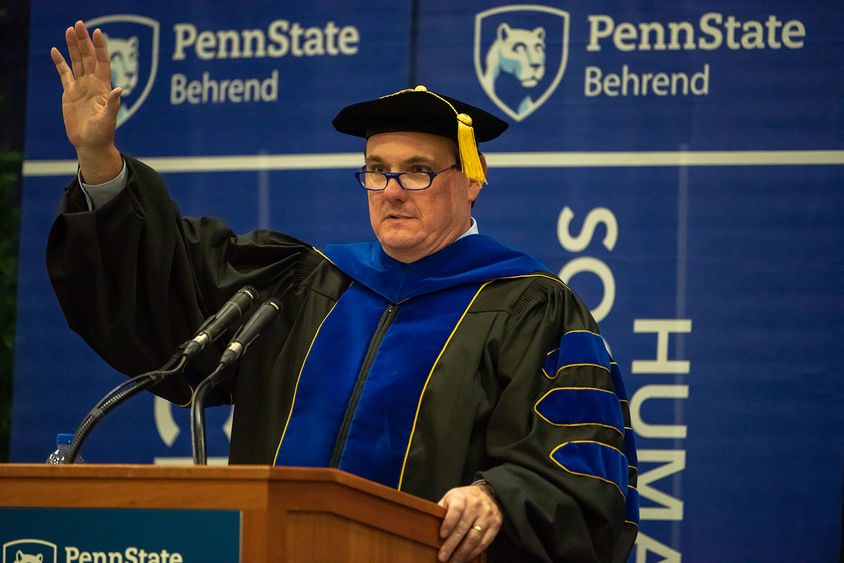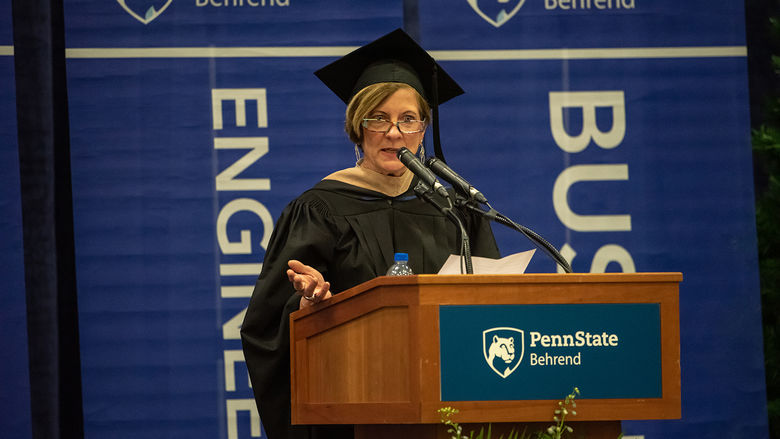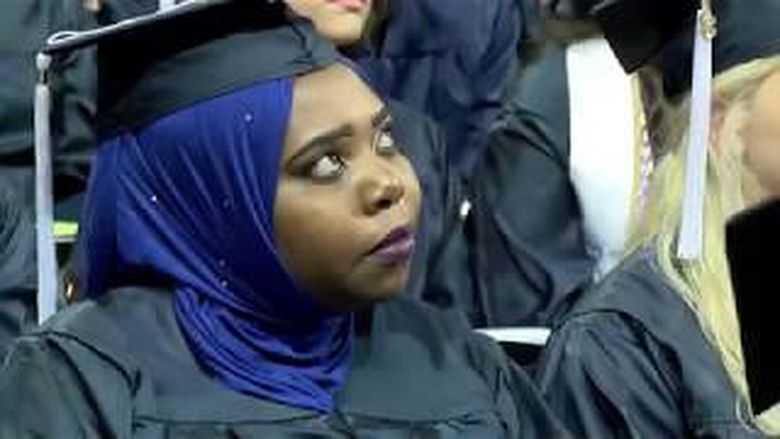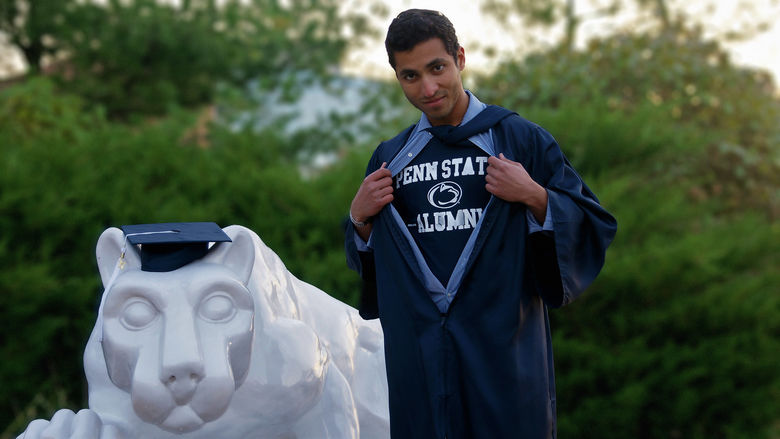
Charles A. Brown, associate professor of accounting, gave the faculty address at Penn State Behrend’s fall 2018 commencement ceremony on Dec. 14.
ERIE, Pa. — Charles A. Brown, associate professor of accounting, gave the faculty address at Penn State Behrend’s fall commencement, which awarded 202 new undergraduate degrees and 33 master’s degrees.
The ceremony was held Friday, Dec. 14, in the college’s Junker Center.
Brown is a certified public accountant whose research interests include auditor decision-making, market-based prediction and forecasting, applied managerial and cost accounting studies, and accounting educational issues. Since 2009, he has served as the college’s faculty athletics representative to the NCAA, coordinating oversight of the academic integrity of Behrend’s athletics program and serving as an advocate for student-athlete well-being. In January, he will join the NCAA Division III Management Council, the governing committee charged with interpreting and implementing all policies affecting Division III student-athletes.
Brown’s address, “Life and Perspective,” can be found below.
---
It is an honor and a privilege to be speaking to the graduating class this evening. However, I suspect a number of you are thinking, why in the world is an accountant speaking at commencement? To put all of you at ease, I am not from the IRS and I am not here to collect unpaid taxes!
How many of our soon-to-be-graduates took CAS 100? For those of you in the audience, CAS 100 is Effective Speech, focusing on public speaking. Think back to the feelings you had while taking that course. You see, public speaking is like life — we are presented with a multitude of opportunities that are prestigious and exhilarating and fun but at the same time can be difficult, and challenging, and a bit scary, like doing a commencement address or a speech in CAS 100 or earning your college degree.
As you sit here tonight, I suspect you might be reflecting on your college experience and remembering those courses and moments that gave you the emotions of CAS 100. You’re also probably thinking about those people who are most important to you and who helped you along your journey. And finally, you’re probably thinking — it’s here. I finally made it! I am getting my degree and the ultimate goal has been accomplished!
My goal tonight is to provide you with a couple of stories to help you understand that whatever happens in life — good or bad — it’s always best to take a step back and to put things into proper perspective and to remember what’s most important in your life.
In the fall of 1999, I applied to many universities in my job search. Two schools rose to the top — Indiana University of Pennsylvania and Penn State Behrend. During the interview process, IUP offered me a job and gave me two weeks to decide. During that time, Behrend did not contact me for a second interview. The IUP deadline had arrived. While a bit disappointed that I hadn’t heard from Behrend, I contacted IUP and with excitement and exhilaration accepted their offer to start in the fall of 2000.
I suspect many of our graduates have already had this amazing feeling, accepting their first job offer. My wife and I were tremendously happy and excited about the next career move. We reflected on all of those people who helped us along the way. While Behrend was high on our list, we hadn’t received a phone call for that second interview — until the next day!
You see, 24 hours after accepting at IUP, I got the call from Penn State Behrend. My initial thought was, you know you could’ve called yesterday! But very calmly and with no regrets I told Dr. Magenau, the former director of the Black School of Business, that I had just accepted a position at IUP, but if the position at Behrend was still available next year to please give me a call.
While I had some conflicting emotions, I had no regrets. I put into action some of the most important principles that my parents had taught me: 1) If you make a commitment, stick to it, and 2) If you say you are going to do something, do it. I maintained my trustworthiness and my reliability as a person, principles that, if broken, can never be repaired.
So how did I end up at Behrend? Well, after a year, the position went unfilled. So I applied and I was finally offered that second interview, and at the conclusion of it I was offered the job. At that moment, I knew I was going to be a Penn Stater!
My wife and I, along with our newborn daughter, moved to Erie in the summer of 2001. We purchased our first home, we settled into Erie, and we couldn’t imagine life getting any better. But then life-changing events have a way of jolting us and putting things back into perspective. You see, less than two weeks after starting my career at Behrend, we all witnessed on TV the horrifying events that unfolded on Sept. 11, 2001. All of those things that seemed so important just minutes before didn’t matter. At that moment, what mattered was the safety of our family. We were thinking about our parents and relatives and we wondered if our neighbor, who was a flight attendant, was OK. These life-changing events, like tonight, have the power to snap us back into proper perspective and to help us focus on what is truly most important.
I want to share with you one last story that was shared with me a number of years ago by a now-retired Behrend colleague. The story is not his and I do not know its origin. Some of you may have heard it before. But for me, this story always helps me to keep my life in proper perspective. I hope it does the same for you.
One day, a professor stood before his philosophy class. To start the class he wordlessly picked up a very large and empty glass jar and placed it on the desk. He then proceeded to fill it with golf balls. He then asked the students if the jar was full, and they agreed that it was.
And then the professor picked up a box of pebbles and poured them into the jar. He shook the jar slightly so the pebbles could roll into the open areas between the golf balls. He then asked the students again if the jar was full. They agreed that it was.
Then the professor picked up a box of sand. And the students began to laugh as he poured the sand into the jar. And of course the sand filled up all the empty crevasses left in the jar. And he again asked the students if the jar was full. Now a bit frustrated, the students responded with an emphatic yes, the jar is full!
Then, one last time, the professor reached down and picked up two beers and poured the entire contents into the jar, effectively filling the empty space between the sand. The students laughed. As the laughter subsided, the professor said, now I want you to recognize that this jar represents your life. The golf balls are the most important things! Your family, your children, your health, your friends, your passions and your principles. If everything else was lost, and only they remained, your life would still be full.
The pebbles represent the other things that matter, like your job, your salary, your house, and your car. What’s the sand? The sand is everything else. It’s the small stuff and the minutiae that doesn’t really matter.
If you put the sand into the jar first, there is no room for the golf balls or the pebbles. The same goes for life.
If you spend all your time and energy on the small stuff, you will never have room for the things that are most important to you. Pay attention to those things that are critical to your happiness. Spend time with your parents, your children, your grandparents. Take your spouse or significant other out to dinner. Go create unforgettable memories with your friends. There will always be time to clean the house, shovel the snow, or to post that amazing photo of your dinner on Facebook.
Take care of the golf balls first — those things that are most important. Set your priorities, because the rest is just sand. As the professor was wrapping up, one of the students raised her hand and inquired, “What does the beer represent?” The professor smiled and said, “I’m glad you asked. The beer just shows you that no matter how full your life may seem, there’s always room for a couple of beers with a friend.”
Congratulations, graduates. Good luck and Godspeed.



